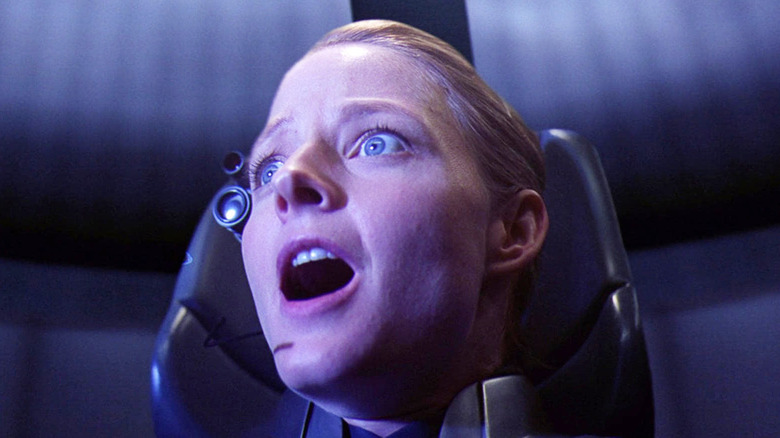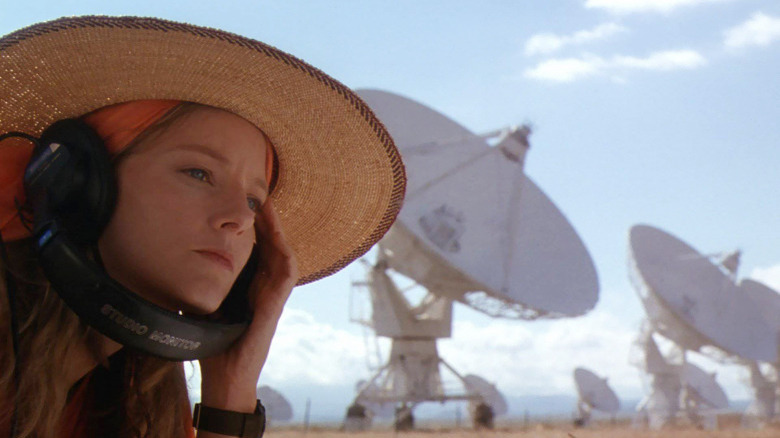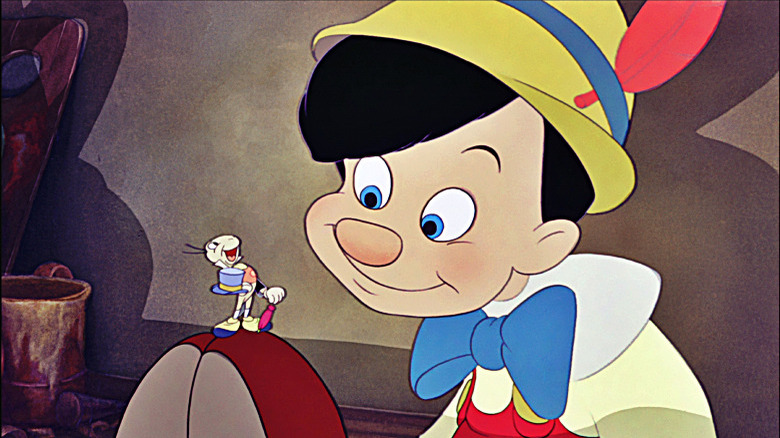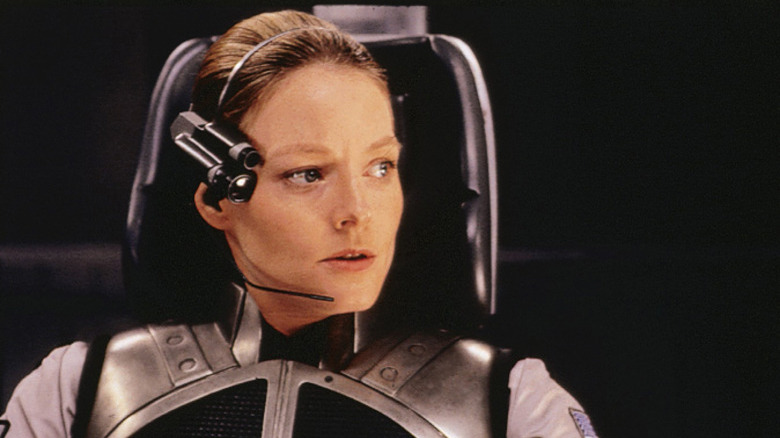A Legal Battle With Francis Ford Coppola Could Have Been The End Of Contact
"Contact" was the first movie Robert Zemeckis directed after winning an Oscar for Best Director on "Forrest Gump" in 1995. The film stars Jodie Foster as Ellie Arroway, a scientist whose lifelong search for proof of extraterrestrial life is vindicated when she uncovers a mysterious signal from Vega, a star system 26 light-years away from Earth. Ellie spends much of the movie debating the validity of this signal and its implications with those in her orbit, including the Christian philosopher and her part-time lover Palmer Joss (Matthew McConaughey). When Ellie argues that he cannot actually prove God exists, Palmer asks Ellie if she loved her late father, Theodore (David Morse), who fostered her fascination with the stars at a young age.
Upon insisting she did, Palmer simply replies, "Prove it."
Their shared propensity for vintage pop rock needle-drops and an effects-heavy third act aside, "Contact" is far less spectacle-driven and much more introspective than Zemeckis' other work (with the exception of perhaps his most mature movie, "Cast Away"). It's also a film tinged with sadness due to the mid-production death of Carl Sagan. The author of the 1985 novel upon which Zemeckis' 1997 movie of the same name was based, Sagan had been diagnosed with cancer two years prior to his death in 1996. All the same, he continued to work on the film up until his passing, earning both a co-producing and story credit.
Making matters even worse, the movie found itself marred in a legal battle between Francis Ford Coppola and Warner Bros. (the studio behind "Contact") shortly after Sagan died.
Sagan and Coppola's history
In Vulture's oral history about the making of "Contact," scientist and writer Ann Druyan — who was married to Carl Sagan at the time of his death and co-wrote the movie's story with him — recalled what happened right after he died. No sooner had Druyan and her youngest son returned from Sagan's funeral than they were served with a summons. Druyan explained:
"Years earlier, even before I knew Carl, Francis Ford Coppola had come to Ithaca because he wanted to collaborate with Carl on a science-fiction movie. And nothing ever came of it. He had 20 years to do something, and he never did it. This was his way of getting an injunction to prevent the movie from going forward. Only a little bit of the movie had been shot at that point."
According to a report from Variety in 1996, Coppola's lawsuit alleged that Sagan's novel "Contact" was based on an idea by Coppola for a TV project in which humanity makes first contact with other-worldly life. Although the lawsuit stated Sagan had the right to publish a book based on the premise, it claimed he was meant to share his revenue with Coppola's Zoetrope label under the terms of a contract Sagan entered in 1975.
"Contact" executive producer Lynda Obst avoided pulling any punches in her assessment of the situation, stating, "Francis just went insane and decided that because he once had a conversation with Carl that he had something to do with 'Contact.'" Druyan added, "I couldn't even believe that anyone would be so heartless." Indeed, why had Coppola waited until such an indelicate moment to take action against Sagan, the actual merit of his lawsuit aside? To understand that, we have to talk about "Pinocchio."
Specifically, the "Pinocchio" film Coppola never made.
No strings on Coppola
In July 1994, the Los Angeles Times reported Francis Ford Coppola was preparing to direct a live-action movie adapted from Carlo Collodi's famed 1883 novel "The Adventures of Pinocchio" for Sony. The director was on a roll with live-action films based on literary classics at the time, having directed "Bram Stoker's Dracula" for Sony in 1992 and produced "The Secret Garden" for Warner Bros. in 1993. He also produced "Mary Shelley's Frankenstein" for Sony, which opened in theaters near the end of 1994.
Fred Fuchs, the president of Coppola's American Zoetrope Studio at the time, told the LA Times that a movie version of "Pinocchio" was Coppola's "lifelong dream" but insisted it was only in the early stages of pre-production. A separate source for the outlet claimed Sony was "a bit concerned" about a conflict with Warner Bros., which had looked into making the film with Coppola in the early 1990s. "It really didn't go anywhere," said Fuchs at the time. He added, "There was no deal with Warner Bros. regarding Francis' script or this project."
Truth is, the situation was a tad messier than that. Coppola would later file a lawsuit alleging Sony dropped his "Pinocchio" film at the behest of Warner Bros., which claimed it had the rights to the movie under a contract Coppola had signed in 1991 (per the New York Times). Coppola, on the other hand, said he never had a contract with Warner Bros. and blamed the studio for effectively killing the project. Prior to going to trial, the judge in the case ruled there was no contract, leaving it to the jury to decide if Warner Bros. had a valid reason to believe there was one.
This brings us back to "Contact."
Coppola lost ... and won
Francis Ford Coppola filed his "Contact" lawsuit against Warner Bros. and Carl Sagan around the same time all this stuff between him and Warner Bros. over "Pinocchio" was really heating up. Speaking to Vulture, Ann Druyan said it was only after being served a summons that she was even made aware of what was going on:
"The executive in charge at Warner's, Courtenay Valenti, she was like, 'Don't worry about it. We have your back. He is angry at us over 'Pinocchio,' and that's why he's doing this. And there's no reason why you should even be involved.'"
The whole experience was obviously painful for Druyan, coming at a time when she had only just begun to grieve Sagan's passing. "I was deposed many times by [Coppola's] lawyers, and I'd be sitting there — this is in the months following Carl's death, when I was just barely holding it together, in such pain and despair," she said. "They would show me manuscripts of Carl's with his beautiful little Brooklyn public-school handwriting in the corners, and I would start weeping just at the sight of his writing."
By early 1998, Coppola's "Contact" lawsuit had been dismissed. However, the judge for the case actually agreed that Sagan had violated (to quote Variety) "some terms" of his contract with Coppola for the project. All the same, he ruled Coppola had waited too long to file his suit, and their deal was no longer enforceable as written. Coppola's "Pinocchio" lawsuit, on the other hand, led to the director and Fred Fuchs being awarded $20 million for lost income from the film and an added $60 million for Warner Bros. stopping the movie from being made at Sony instead.
Shockingly, Coppola and Warner Bros. have declined to work together since then.



